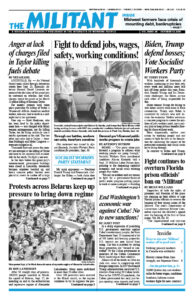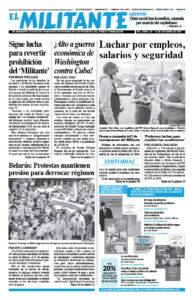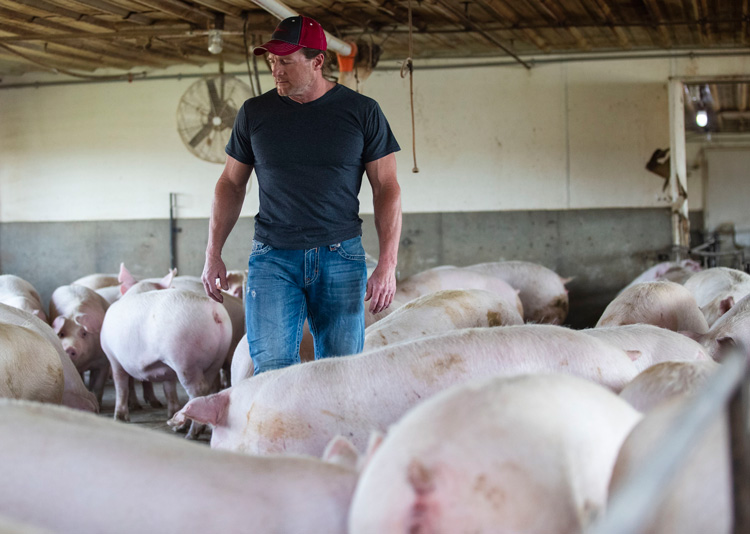LINCOLN, Neb. — Rising debts and plummeting incomes are forcing more farmers to file for bankruptcy, despite the likelihood that federal payments supposedly to compensate farmers will hit record levels.
About 580 farmers filed for Chapter 12 bankruptcy protection in the 12-month period that ended June 30 — 8% more than a year earlier.
Vernon Jantzen, a leader of the Nebraska Farmers Union and president of a council that operates a hotline for farmers in distress, told the Militant, “I’ve have had a tremendous increase in calls in the last few months from farmers.
“The small amount of federal aid farmers received has wound up for personal family needs with little or nothing left for payment to lenders and other farm expenses,” he said. “A large percentage of the government aid went to the agriculture production companies and big landowners.”
Like most small farmers, Jantzen depends on working a job to supplement the income he gets from a 200-acre farm near Beatrice. He drives a school bus and a grain delivery truck part time.
“Farmers have struggled with the low prices of farm commodities for the last six years,” he said. “Then the pandemic hit. There are two tracts that farmers supply: one, to all the grocery stores, and the other to schools and restaurants. When they both were shut down, it was a double whammy.”
Earlier in the year, some farmers were forced to euthanize livestock when packinghouse owners shuttered plants after bosses failed to do anything to prevent the spread of coronavirus to workers on the shop floor.
“It was a blow to farmers with the slowdown in production,” Jantzen said, “but it was criminal what the government and the packing plant employers did, forcing workers to produce without strict safety measures for protection against the virus.”
According to the American Farm Bureau Federation, farm income from the sales of crops and livestock has fallen by $12 billion since last year. Moreover, farm debt and debt-to-asset levels continue to climb.
The Department of Agriculture is to hand out a second round of “pandemic” aid amounting to $13 billion. But some two-thirds of the previous round of payments ended up in the pockets of the top 10% of recipients.
Betty Lennington, 74, a retired farmer who lives near Tekamah, is concerned about the increasing drought conditions on her now rented-out bottomland farm of almost 300 acres. It stands near the Missouri River and was flooded in 2019.
“Flooding, low corn prices, a world pandemic, and now drought conditions on unirrigated land is becoming a disaster,” Lennington told the Militant.
The drought “can upset the pollination cycle and ruin the corn harvest,” she pointed out.
Damage to farmers’ land, crops and livestock as a result of storms, floods and drought happens many times over. But these natural disasters have nothing to do with the ruin working farmers face as a result of their exploitation by capitalist bankers and monopolies.
In order to buy land and meet the rising costs of seed, livestock, machinery and other operating expenses, farmers must borrow to have any chance of making it. Farmers’ “ownership” of the land becomes a form of their exploitation. Interest payments to the bankers holding their mortgages is the principal way they are squeezed by the capitalist class.
They also face the big-input food processing and distribution companies that dictate to farmers the price they will pay for seed and fertilizer, and the price they will get for what they produce.
If little profit is made in a given year, the farmer will be forced to use some of the money normally spent carrying out farm production for personal consumption. If this situation persists for any period of time, working farmers are forced off the land.
In the face of conditions that are driven by capitalism’s debt and mortgages system, the Socialist Workers Party 2020 campaign demands immediate government relief to fully cover farmers’ production costs, including living expenses for themselves and their families.
The party’s platform calls for an end to all foreclosures and the nationalization of the land, guaranteeing its continuing use by those who live on and till it, not “repo” seizures by absentee bankers, landowners or capitalist farmers.
“This is the only way farmers can protect themselves and ensure they can work the land,” Alyson Kennedy, the SWP’s candidate for president, told the Militant. “Any movement by the working class to defend our own interests must be based on forging an alliance with farmers — who are exploited by the same capitalists as we are.”


